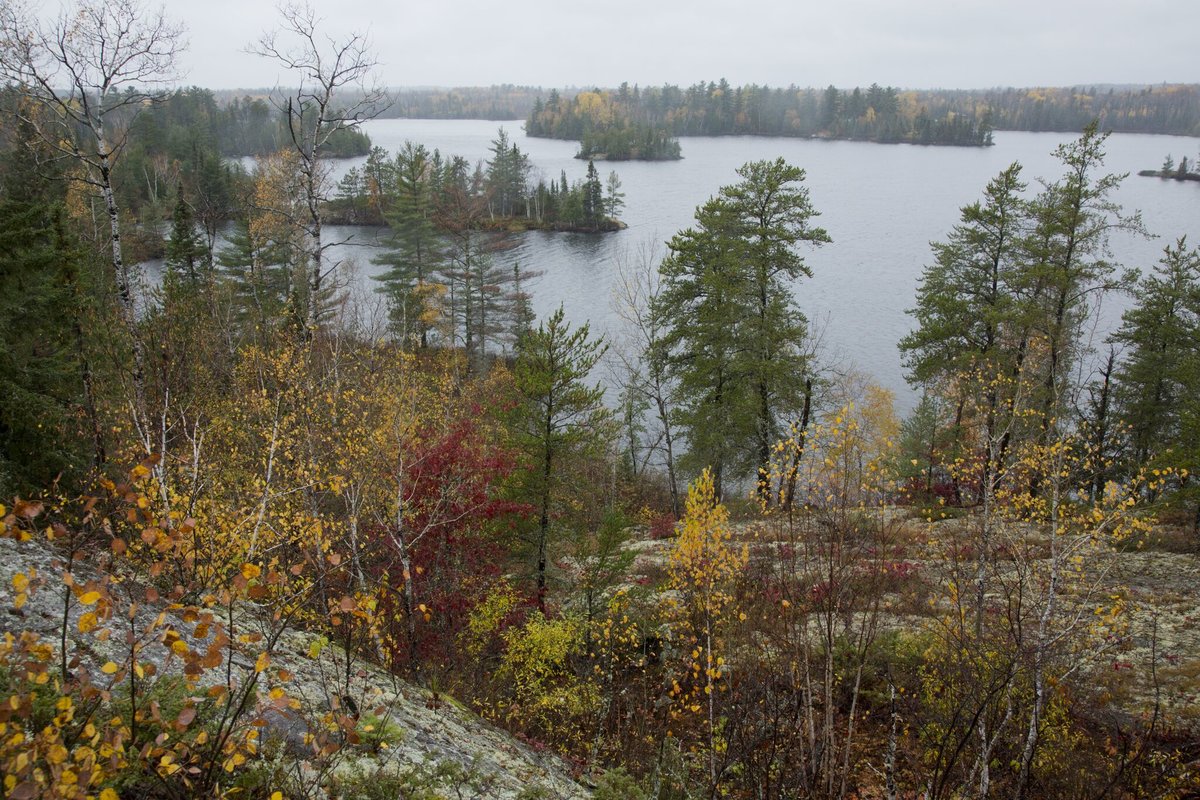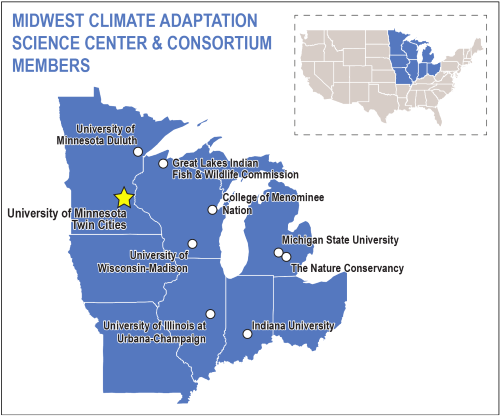
CFANS faculty drive actionable climate science as Midwest Climate Adaptation Science Center leaders
University of Minnesota will host and lead the U.S. Geological Survey’s newly formed consortium of eight universities and natural resource organizations

In late September, the U.S. Department of the Interior announced the University of Minnesota as the University host of the newest U.S. Geological Survey Climate Adaptation Science Center (CASC). It is the ninth and newest CASC in a national network dedicated to providing science to help managers of the country’s natural resources, including fish and wildlife, adapt to climate change.
Three faculty members from the University of Minnesota’s College of Food, Agricultural and Natural Resource Sciences (CFANS) will serve as leaders in the new Midwest CASC.
- Susan Galatowitsch, PhD, professor in the Department of Fisheries, Wildlife and Conservation Biology — co-PI and Midwest CASC Advisor for Graduate Trainees
- Heidi Roop, PhD, assistant professor in the Department of Soil, Water and Climate, and Extension specialist — Midwest CASC Program Lead for Capacity-Building
- Michael Dockry, PhD, assistant professor in the Department of Forest Resources — Midwest CASC Program Lead for Tribal Relations
In their Midwest CASC leadership roles, Galatowitsch, Roop, and Dockry will apply their extensive expertise to build a Center that advances adaptation science and the practice of “actionable science” across the Midwest region. Actionable science has evolved rapidly over the last decade, and the CASC network has established itself as a leader in the field. It is described by CASC as user-focused, action-oriented science that addresses real-world climate adaptation challenges.
“I’m thrilled to have the opportunity to serve on the Midwest CASC leadership team,” said Roop. “The Midwest CASC brings together an impressive consortium of partners who all add their unique expertise, experiences, and perspectives to the Center to help us accelerate adaptation actions across the Midwest. Together, we are deeply committed to not only advancing the science, but also supporting and being responsive to the many on-the-ground needs of our region’s communities, natural resource managers, Tribes, and conservation organizations as they confront the challenges of climate change. As we begin our work, I’m looking forward to strengthening current relationships and engaging new partners to develop and exchange knowledge.”
The Midwest CASC will pay particular attention to engage and support Tribes’ climate adaptation science goals to manage and protect land, water and natural resources, and treaty resources. The Midwest CASC builds on the unique and robust experience and leadership of Midwest Tribes with adaptation science and practice. This includes a summer research experience for undergraduates focused on Tribal participation to train the climate scientists of the future.
“Tribes have been leaders in climate adaptation and resilience in the Midwest and the CASC will continue to strengthen collaborative partnerships with Tribes to improve science, sustain our lands, and strengthen our communities,” said Dockry. “ By supporting tribal sovereignty and treaty rights, the Midwest CASC will support all peoples and ecosystems throughout the Midwest.”
The Midwest CASC was added to the national network of federal climate adaptation science centers in order to promote adaptation innovation for all habitats of the region, including the world’s largest freshwater lake system, the upper basin of our nation’s largest river system, wetlands that range from peatlands to potholes, boreal and hardwood forests, and grasslands — all within a matrix of working lands and urban areas.
“Our nine-institution consortium will spearhead adaptation science for the Midwest Region through a combination of PI (Principal Investigator) research to fill key knowledge gaps and synthesis projects to develop decision-making tools,” said Galatowitch. “In this arena, research must be ‘co-produced’ with community stakeholders to ensure we do science that is not only potentially useful but that will be used. Our emphasis on research co-production will create terrific opportunities for our CASC graduate students and post-docs, who will gain the capacity to do community-engaged research, as well as expanding their discipline-based expertise.”
About the Midwest CASC
The Midwest CASC consortium will be hosted at the University of Minnesota’s Institute on the Environment and will include the University of Wisconsin; the College of the Menominee Nation; the Great Lakes Indian Fish and Wildlife Commission; Michigan State University; Indiana University; the University of Illinois; and the Nature Conservancy. This consortium was selected after an open competition and extensive review by scientific experts.
“In order to address the climate crisis, we need to be guided by the best available science. Integrated collaboration with educational and natural resource organization partners ensures that federal, tribal and state resource managers have access to the collective wisdom of world renowned experts. The Midwest Climate Adaptation Science Center will better position us to mitigate climate impacts while focusing needed attention to Tribal and state resources that are particularly vulnerable to climate change,” said U.S. Secretary of the Interior Deb Haaland.
About the CASCs
Climate Adaptation Science Centers are each hosted by a public university, composed of a multi-institution consortium and managed by the National CASC that oversees the nationwide network and pursues multi-region projects of national significance. These partnerships ensure access to a broad range of scientific expertise, production of high-quality science and sharing of funds, resources and facilities. University involvement also allows the CASCs to introduce students to the idea of “co-producing” science, in which scientists and decision-makers work closely together to ensure scientific research and products are usable and directly address real-world problems. Learn more about the history of the CASCs.






